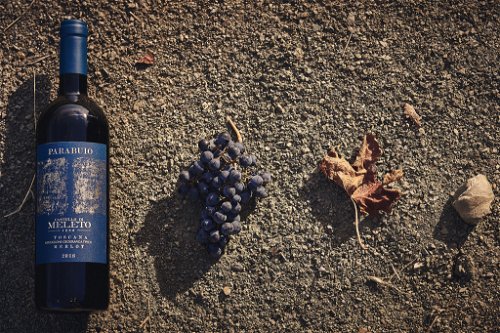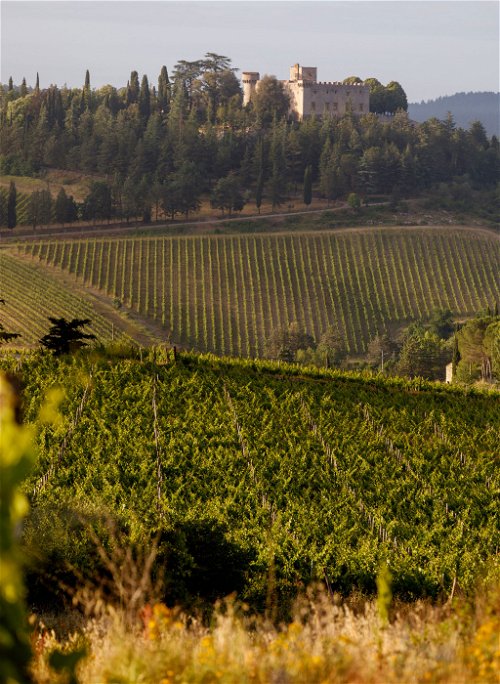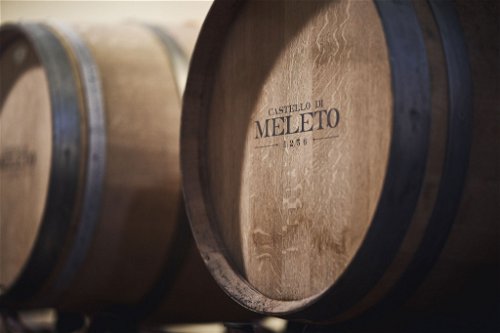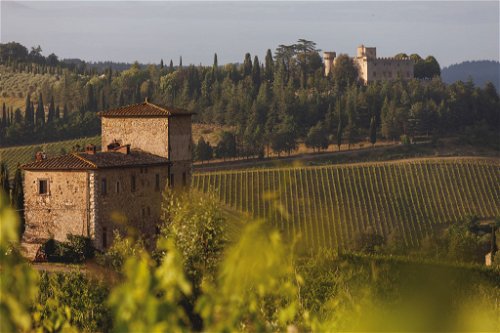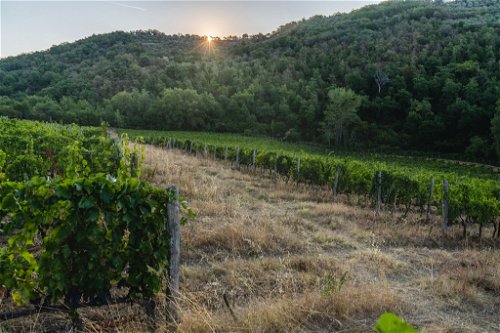Alberto Stella: "As a Sicilian, I am more sensitive than my Tuscan colleagues".
Since 2019, the young winemaker has been at the helm of the "Castello di Meleto" winery. Alberto Stella talked to Falstaff about a breath of fresh air for the almost 800-year-old estate in Chianti Classico, what's special about the Parabuio and the trends in Tuscany.
Falstaff: You are originally Sicilian. How did you get into Chianti Classico?
Alberto Stella: My family moved to Verona when I was 12. There also began my love for wine, with Amarone della Valpolicella. I decided to study oenology in Trento. I then worked for a few years in Sicily, Tuscany and abroad. When I was back in Verona, I got the offer from Castello di Meleto.
I started working there in August 2019 and only had 15 days to prepare for harvest. It was a jump in the deep end for me. To understand the terroir, I bought wines from all over the Chianti Classico region. I saw huge potential. But the wines of the "Castello di Meleto" were particularly nice. I realised that we have very good locations.
It's autumn, harvest time. What will the "Castello di Meleto" vintage 2023 look like?
This year we had big problems with downy mildew, a fungal disease. We did a lot to protect our vineyards, but still lost 10 to 15 percent of the harvest. Especially with Merlot, which is somewhat more sensitive to it than Sangiovese. We are glad that despite the organic viticulture that we practice, we have managed to keep the losses small. Qualitatively, however, the harvest looks very good, if the weather remains nice, 2023 should also be an excellent vintage!
As you mentioned yourself, the winery has been certified organic for a few years. How did this decision come about? What other developments can be seen at Castello di Meleto?
Yes exactly, we are certified organic since 2021. We wanted our vines to better reflect their terroir and become more resilient so that they would produce good grapes even in difficult years. This is especially important today because of climate change. For this we need healthy soil; the roots should go deeper to find water. We would like to let our vineyards grow for 60 or 70 years, instead of replanting them every 30 or 40 years, as they do in France. This makes the wines better and more storable.
Also, since I started in 2019, we have noticed that in some of our plots are hiding excellent fruit and from them we have made our Sangiovese site wines "Casi", "Poggiarso" and "Trebbio". We used to make it our "Riserva". Our site Merlot "Parabuio" already exists since 2018.
What is so special about the Parabuio? Otherwise you produce wines almost only from Sangiovese.
It grows in the three-hectare Parabuio vineyard, a very special place. It is located in the middle of the forest, under the village of Vertine. It is shady there, a river flows past the lower part of the vineyard, so it is cool and damp. Why people decided to plant Merlot there in the 90s, I don't know. But the relationship between Merlot and this place is magical! We can let the grapes hang here for a long time, they never dry out. In this way they reach optimal maturity. We harvest on three or four different days. Fermentation takes place in small tanks, with wild yeasts, but temperature controlled. After malolactic fermentation, the wine is placed in new wooden barrels with a light toasting for 18 months. The production of the "Parabuio" requires a lot of organisation and sensitivity. But I am Sicilian and therefore more sensitive than my Tuscan colleagues (laughs).
What are general trends and movements in Tuscany today?
I see a big trend right now towards reduction, less is more. This is also how we have been working at Castello di Meleto for a few years now. For me, terroir is like a footprint; if you work too intensively in the vineyard, it becomes weaker. The same thing happens when you use too much oak in the cellar or extract the wines too much.
Today, single-varietal Sangiovese is being vinified more often. A barrique is too intense for me for this one, it needs big wood to keep its identity; between 3000 and 5000 liters. In my opinion, today the whole Chianti Classico goes in this direction, but also other regions.

